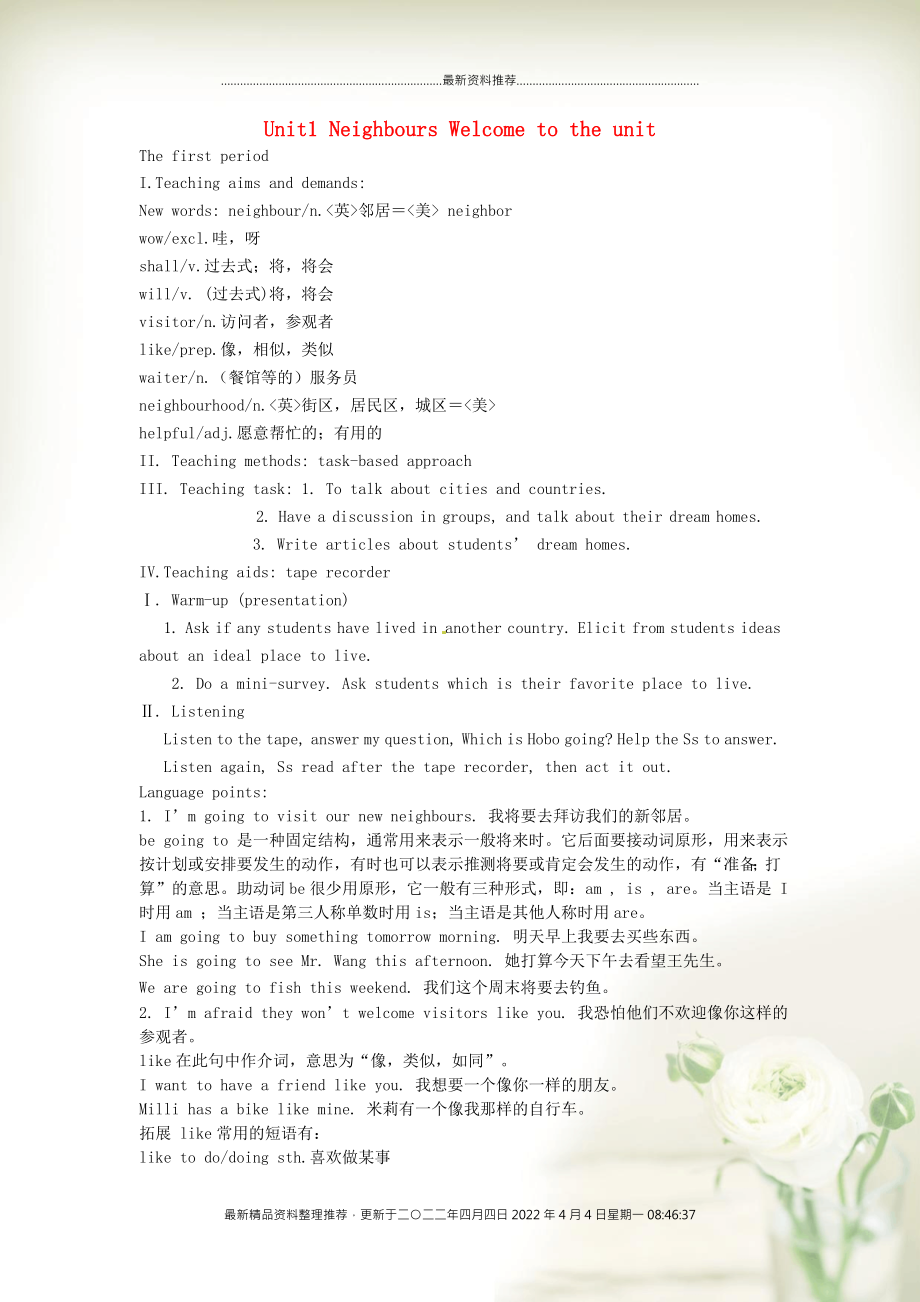《七年級(jí)英語(yǔ)下冊(cè) Unit 2 Neighbours period 1 Welcome to the unit教案 (新版)牛津版》由會(huì)員分享��,可在線閱讀��,更多相關(guān)《七年級(jí)英語(yǔ)下冊(cè) Unit 2 Neighbours period 1 Welcome to the unit教案 (新版)牛津版(2頁(yè)珍藏版)》請(qǐng)?jiān)谘b配圖網(wǎng)上搜索���。
1����、最新資料推薦Unit1 Neighbours Welcome to the unitThe first periodI.Teaching aims and demands:New words: neighbour/n.鄰居 neighborwow/excl.哇�����,呀shall/v.過(guò)去式�;將,將會(huì)will/v. (過(guò)去式)將�����,將會(huì)visitor/n.訪問(wèn)者���,參觀者like/prep.像���,相似,類似waiter/n.(餐館等的)服務(wù)員neighbourhood/n.街區(qū)�����,居民區(qū)����,城區(qū)helpful/adj.愿意幫忙的;有用的II. Teaching methods: task-based appr
2����、oachIII. Teaching task: 1. To talk about cities and countries.2. Have a discussion in groups, and talk about their dream homes. 3. Write articles about students dream homes.IV.Teaching aids: tape recorder. Warm-up (presentation) 1. Ask if any students have lived in another country. Elicit from stude
3、nts ideas about an ideal place to live.2. Do a mini-survey. Ask students which is their favorite place to live. Listening Listen to the tape, answer my question, Which is Hobo going? Help the Ss to answer. Listen again, Ss read after the tape recorder, then act it out.Language points:1. Im going to
4�、visit our new neighbours. 我將要去拜訪我們的新鄰居。be going to 是一種固定結(jié)構(gòu)�,通常用來(lái)表示一般將來(lái)時(shí)。它后面要接動(dòng)詞原形����,用來(lái)表示按計(jì)劃或安排要發(fā)生的動(dòng)作,有時(shí)也可以表示推測(cè)將要或肯定會(huì)發(fā)生的動(dòng)作��,有“準(zhǔn)備;打算”的意思�。助動(dòng)詞be很少用原形,它一般有三種形式�,即:am , is , are。當(dāng)主語(yǔ)是 I 時(shí)用am �;當(dāng)主語(yǔ)是第三人稱單數(shù)時(shí)用is;當(dāng)主語(yǔ)是其他人稱時(shí)用are����。I am going to buy something tomorrow morning. 明天早上我要去買些東西。 She is going to see Mr. Wang thi
5��、s afternoon. 她打算今天下午去看望王先生����。 We are going to fish this weekend. 我們這個(gè)周末將要去釣魚。2. Im afraid they wont welcome visitors like you. 我恐怕他們不歡迎像你這樣的參觀者���。like在此句中作介詞�����,意思為“像�,類似���,如同”���。I want to have a friend like you. 我想要一個(gè)像你一樣的朋友。Milli has a bike like mine. 米莉有一個(gè)像我那樣的自行車��。拓展 like常用的短語(yǔ)有:like to do/doing sth.喜歡做某事woul
6�、d like to do 想要做某事feel like doing 想做某事look like看起來(lái)像.Ask the students to do PartA. Where can you find these people? Match them with the places. Write the correct letters in the boxe. Then check the answers with the whole class. Discussion (task) Ask the students to talk about their neighbour. Give them several minutes to prepare. Then ask some of groups to act out the dialogues. .Sum-up Go through the new words and the language points learnt during this lesson. Homework 1.Review the contents of this lesson.2. Prepare the Reading.最新精品資料整理推薦,更新于二二二年四月四日2022年4月4日星期一08:46:37
 七年級(jí)英語(yǔ)下冊(cè) Unit 2 Neighbours period 1 Welcome to the unit教案 (新版)牛津版
七年級(jí)英語(yǔ)下冊(cè) Unit 2 Neighbours period 1 Welcome to the unit教案 (新版)牛津版

